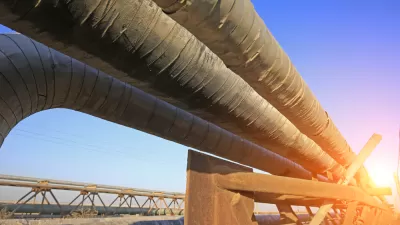The environmental impact statement on the Keystone XL oil pipeline released Friday by the U.S. State Department delivered news that environmentalists will not be happy to hear. The study finds that the project will not exacerbate oil extraction.
By concluding that building the Keystone XL pipeline would not significantly "change the overall development of the [Alberta] oil sands", the Final Supplemental Environmental Impact Statement (SEIS) released by the State Department on Friday removes a major obstacle to approval of the controversial pipeline. Essentially, the report concludes that, "[b]ecause of global demand, the oil will most likely get to market whether or not the pipeline is built," writes Coral Davenport. As Planetizen readers are likely aware, oil delivery by rail has accelerated in the absence of pipeline capacity.
"In a major speech on the environment last summer, Mr. Obama said that he would approve the pipeline only if it would not 'significantly exacerbate' the problem of carbon pollution. He said the pipeline’s net effects on the climate would be 'absolutely critical' to his decision," notes Davenport. "The conclusions of the report appear to indicate that the project has passed Mr. Obama’s climate criteria, an outcome expected to outrage environmentalists, who have rallied, protested, marched and been arrested in demonstrations around the country against the pipeline."
"The report released on Friday, however, is far from the final decision on the project," Davenport adds. The Departments of Defense, Justice, Interior, Commerce, Transportation, Energy and Homeland Security, and the Environmental Protection Agency will all have a chance to comment on the project.
FULL STORY: Report May Ease Way to Approval of Keystone Pipeline

Trump Administration Could Effectively End Housing Voucher Program
Federal officials are eyeing major cuts to the Section 8 program that helps millions of low-income households pay rent.

Planetizen Federal Action Tracker
A weekly monitor of how Trump’s orders and actions are impacting planners and planning in America.

The 120 Year Old Tiny Home Villages That Sheltered San Francisco’s Earthquake Refugees
More than a century ago, San Francisco mobilized to house thousands of residents displaced by the 1906 earthquake. Could their strategy offer a model for the present?

HSR Reaches Key Settlement in Northern California City
The state’s high-speed rail authority reached an agreement with Millbrae, a key city on the train’s proposed route to San Francisco.

Washington State Legislature Passes Parking Reform Bill
A bill that would limit parking requirements for new developments is headed to the governor’s desk.

Missouri Law Would Ban Protections for Housing Voucher Users
A state law seeks to overturn source-of-income discrimination bans passed by several Missouri cities.
Urban Design for Planners 1: Software Tools
This six-course series explores essential urban design concepts using open source software and equips planners with the tools they need to participate fully in the urban design process.
Planning for Universal Design
Learn the tools for implementing Universal Design in planning regulations.
Ada County Highway District
Clanton & Associates, Inc.
Jessamine County Fiscal Court
Institute for Housing and Urban Development Studies (IHS)
City of Grandview
Harvard GSD Executive Education
Toledo-Lucas County Plan Commissions
Salt Lake City
NYU Wagner Graduate School of Public Service



























